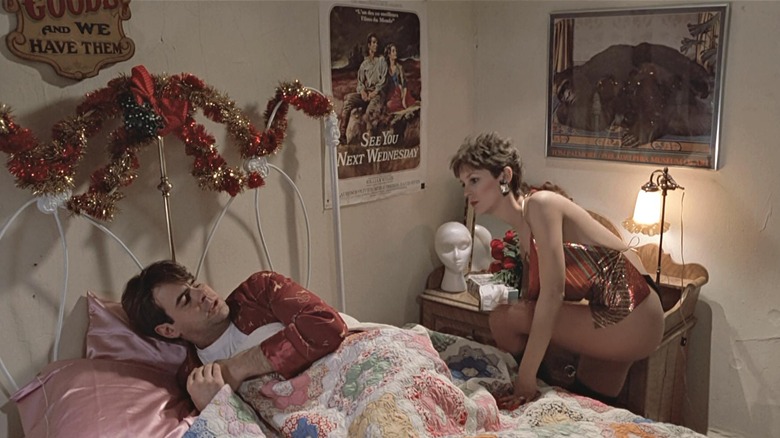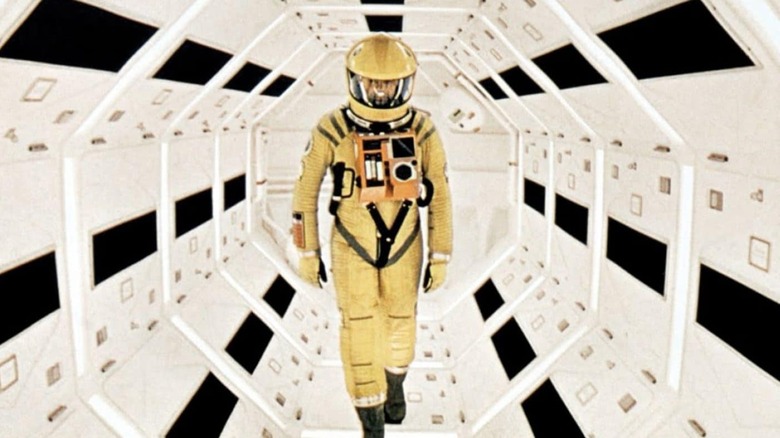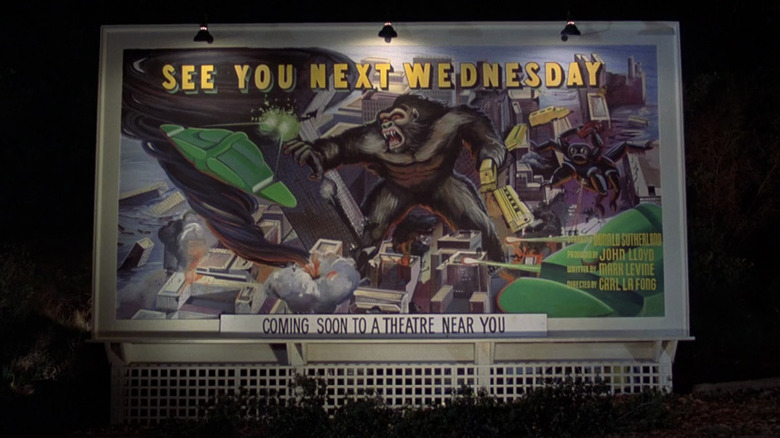How A Throwaway Stanley Kubrick Line Became John Landis' Calling Card
Filmmakers are often called auteurs, the sole author responsible for the overall look and feel of a movie. From the gritty realism of early Scorsese films to the vivid landscapes painted by Tim Burton, these become a filmmaker's "calling card." Sometimes directors take it a step further with Easter eggs in their films that contain a hidden meanings or references.
For example, Robert Zemeckis connects "Back to the Future" and "Death Becomes Her" with the date October 26, 1985. Quentin Tarantino references Antonio Margheriti as a film director in "Once Upon a Time in Hollywood" and an Italian alias in "Inglourious Basterds."
But perhaps no one has had more fun and made better use of Easter eggs than John Landis. The legendary filmmaker has left an indelible mark on Hollywood. His influential filmography spans six decades and includes comedy classics "National Lampoon's Animal House," "The Blues Brothers," "Three Amigos!" and "Coming to America." And if you look closely, you'll find something that continuously shows up in his films. What began as a running gag has evolved through pop culture into something much bigger.
An homage to Stanley Kubrick...and himself
In a 2018 interview, Landis discussed his first movie script, which was called "See You Next Wednesday," and whose title was inspired by Stanley Kubrick's "2001: A Space Odyssey." The phrase "See you next Wednesday" was the last line spoken by Frank Poole's father in a video letter from the character's parents in Kubrick's sci-fi epic. The innocuous line would become Landis' "calling card."
"See You Next Wednesday" was never produced, and Landis described his first screenplay as "terrible but with some really good ideas." Those good ideas would eventually incorporated into future movies. But "See You Next Wednesday" started showing up as a fictitious film within the director's movies, a running gag spanning years. Landis explained:
"And so first I referred to it in my first movie 'Schlock' as like this important movie, and then it sort of became very clear that it's never gonna be made. So any time I take a gag or an idea or something from that script, I can oblige that script all the time, I always give it a credit in the movie."
As a nod to his early work, Landis seemed to have as much fun with his fake movie as he would with his real comedies. The faux "See You Next Wednesday" would be re-cast in 10 of his films.
Where in the world is 'See You Next Wednesday?'
Landis wasted no time putting the gag to use, and the genre of the fake movie would evolve with each appearance. In Landis' first film, "Schlock," the fake flick would turn up as a monster movie. In "Kentucky Fried Movie," it appeared as the movie being watched during the "feel around" where a theater employee would help moviegoers feel what they are viewing on the screen.
It became a disaster movie in "The Blues Brothers," and then a porn film in "An American Werewolf in London." In "Trading Places," it would become a Hollywood Classical era film and then appear as a spy movie in both "Into the Night" and "Spies Like Us." In "Coming to America" it would morph into a "Barbarella"-inspired sci-fi film, and finally, in "Innocent Blood," it appears as a blink-and-you-miss-it movie marquee.
There are additional, less obvious references to the faux film in Landis' works. In the seminal music video for Michael Jackson's "Thriller," the phrase is spoken by a deputy in the movie Jackson and his girlfriend are watching. It would later appear in Jackson's "Black or White" music video as the name of a storage company. In "Twilight Zone: The Movie" an S.S. officer says, "See you next Wednesday" in German. In addition to the poster in "Spies Like Us," a U.S. Army recruiting poster is labeled "The Army can teach you skill. See you next Wednesday."
Hollywood caught on, as non-Landis "See You Next Wednesdays" began cropping up everywhere, beginning with the 1987 spoof film "Amazon Women on the Moon" as the label on a music cassette and a movie poster. It would go on to appear in other non-Landis films, video games, and television shows — and even Michael Bublé's music video for "Hollywood." Not even Landis himself could have written a comeback story like this for the script so terrible it could never become its own movie.


